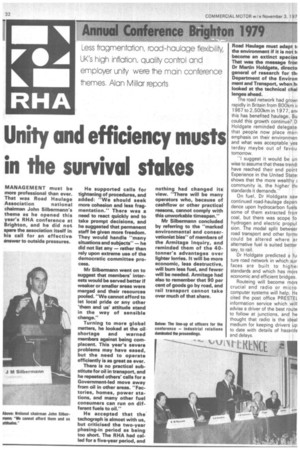Unity and efficiency musts in the survival stakes
Page 34

If you've noticed an error in this article please click here to report it so we can fix it.
MANAGEMENT must be more professional than ever. That was Road Haulage Association national chairman John Silbermann's theme as he opened this year's RHA conference at Brighton, and he did not spare the association itself in his call for an effective, answer to outside pressures. He supported calls for tightening of procedures, and added: "We should seek more cohesion and less fragmentation." There was a need to react quickly and to take prompt decisions, and he suggested that permanent staff be given more freedom. They would handle "many situations and subjects" — he did not list any — rather than rely upon extreme use of the democratic committee process.
Mr Silbermann went on to suggest that members' interests would be served better if weaker or smaller areas were merged and their resources pooled. We cannot afford to let local pride or any other 'them and us' attitude stand in the way of sensible change."
Turning to more global matters, he looked at the oil, shortage and warned members against being complacent. This year's severe problems may have eased, but the need to operate efficiently is as great as ever.
There is no practical substitute for oil in transport, and he repeated others' calls for a Government-led move away from oil in other areas. "Factories, homes, power stations, and many other fuel consumers can run on different fuels to oil."
He accepted that the tachograph is almost with us, but criticised the two-year phasing-in period as being too short. The RHA had called for a five-year period, and
nothing had changed its view. "There will be many operators who, because of cashflow or other practical reasons, cannot comply with this unworkable timespan."
Mr Silbermann concluded by referring to the "marked environmental and conservationist bias" of members of the Armitage Inquiry, and reminded them of the 40tanner's advantages over lighter lorries. It will be more economic, less destructive, will bum less fuel, and fewer will be needed. Armitage had also to remember that 90 per cent of goods go by road, and rail transport cannot take over much of that share.
Road Haulage must adapt ti the environment if it is not t( become an extinct species That was the message fron Dr Martin Holdgate, directo general of research for th■ Department of the Environ ment and Transport, when II( looked at the technical chal lenges ahead.
The road network had growl rapidly in Britain from 800km ii 1967 to 2,500km in 1977, am this has benefited haulage. Bu could this growth continue? D Holdgate reminded delegate: that people now place mori emphasis on their environmen and what was acceptable yes terday maybe out of favou tomorrow.
"I suggest it would be un wise to assume that these trend! have reached their end point Experience in the United State: shows that the more wealthy community is, the higher thE standards it demands."
On fuel, Dr Holdgate savl continued road-haulage depen dence upon hydrocarbon fuels some of them extracted frorr coal, but there was scope fo hydrogen and electric propul sion. The modal split betweer road transport and other form! could be altered where ar alternative fuel is suited better say, to rail.
Dr Holdgate predicted a fu ture road network in which sur faces are built to highei standards and which has more economic and efficient bridges.
Routeing will become more crucial and radio or micro,
computer systems will help. He cited the post office PRESTEL information service which will advise a driver of the best route to follow at junctions, and he thought that radio is the ideal medium for keeping drivers up to date with details of hazards and delays.




























































































































